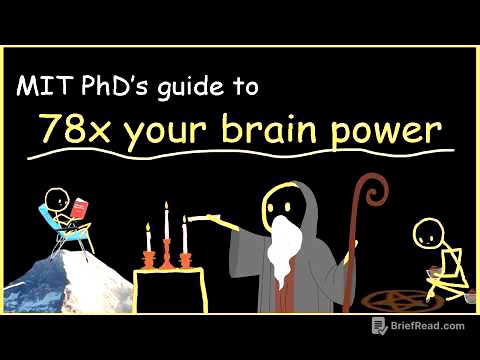TLDR;
This video discusses nine psychological laws that influence human behavior, focusing on how understanding these laws can improve self-awareness and interpersonal interactions. The laws include irrationality, narcissism, role-playing, compulsive behavior, covetousness, short-sightedness, defensiveness, self-sabotage, and repression. Each law is explained with examples and insights into how they manifest in everyday life.
- Irrationality: People are often driven by emotions rather than logic.
- Narcissism: Everyone possesses some degree of self-centeredness.
- Role-Playing: People adapt their behavior based on social contexts.
- Compulsive Behavior: Unhealthy habits can be difficult to break.
- Covetousness: Envy and desire for what others have can drive actions.
- Short-sightedness: Immediate gratification often outweighs long-term goals.
- Defensiveness: People react defensively when they feel threatened.
- Self-sabotage: Self-destructive behaviors can undermine success.
- Repression: Unpleasant memories and emotions can be suppressed.
Intro [0:00]
The video introduces nine psychological laws that affect human behavior. These laws are presented to help viewers understand themselves and others better, with the aim of improving self-awareness and interpersonal relationships. The laws are explained with examples to illustrate how they manifest in everyday life.
Law 1 - Irrationality [1:24]
People are often driven by emotions rather than logic. This irrationality can lead to poor decision-making and inconsistent behavior. Recognizing this tendency in oneself and others can help in navigating social interactions and making more rational choices.
Law 2 - Narcissism [8:40]
Everyone possesses some degree of self-centeredness, or narcissism. This trait influences how individuals perceive and interact with the world. Understanding this inherent narcissism can foster empathy and improve communication by recognizing others' needs and perspectives.
Law 3 - Role-playing [12:57]
People adapt their behavior based on social contexts, essentially playing different roles in different situations. This adaptability is a natural part of human interaction, but awareness of these roles can help individuals be more authentic and self-aware in their interactions.
Law 4 - Compulsive Behavior [17:06]
Unhealthy habits and compulsive behaviors can be difficult to break due to their deeply ingrained nature. Recognizing these patterns and understanding their triggers is the first step toward overcoming them and developing healthier habits.
Law 5 - Covetousness [20:34]
Envy and the desire for what others have, known as covetousness, can drive actions and influence decisions. Understanding this tendency can help individuals focus on their own goals and achievements rather than being consumed by what others possess.
Law 6 - Short-sightedness [23:35]
The inclination to prioritize immediate gratification over long-term goals is a common human trait. Recognizing this short-sightedness can help individuals make more strategic decisions that benefit their future selves.
Law 7 - Defensiveness [28:38]
People react defensively when they feel threatened or criticized. Understanding this defensive mechanism can help individuals communicate more effectively and empathetically, reducing conflict and fostering better relationships.
Law 8 - Self-sabotage [33:58]
Self-destructive behaviors can undermine success and happiness. Recognizing these patterns of self-sabotage is crucial for breaking free from them and achieving personal growth and fulfillment.
Law 9 - Repression [39:36]
Unpleasant memories and emotions can be suppressed as a defense mechanism. Understanding how repression works can help individuals address underlying issues and promote emotional healing and well-being.









